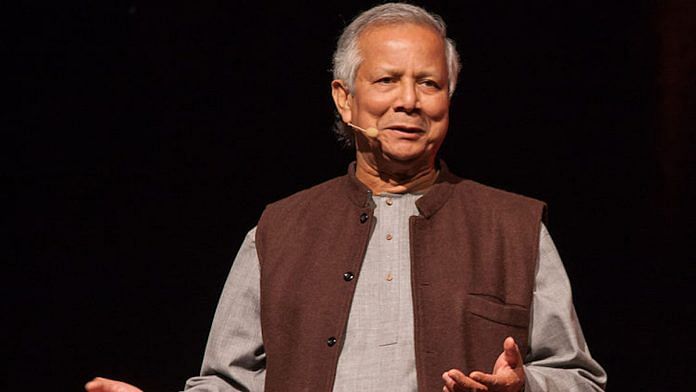New Delhi: Going back to the pre-coronavirus mode of functioning will be “suicidal” for the world, said Bangladeshi economist and Nobel laureate Professor Muhammad Yunus in a conversation with Congress leader Rahul Gandhi Friday.
Yunus added that the pandemic has given the world a chance to “think new”.
“Why do we have to go back to the world with global warming and wealth concentration. Wealth in that world was in few hands. Why do you have to go back to that world where artificial intelligence is taking away jobs for everybody? All the massive unemployment that will be created in the next few decades…do we have to go back to it?” he asked.
He also talked about how coronavirus had stopped the entire economic machinery but criticised the emphasis everyone has been placing on going back to the status quo.
“What is the hurry to go back? Should we at all go back? Because that world was a very horrible world,” he said.
Yunus established Bangladesh’s ‘Grameen Bank’ in 1983 — a microfinance organisation meant for community development — and won the Nobel Peace Prize in 2006 for pioneering concepts of microcredit and microfinance.
Gandhi’s interaction with Yunus was published on the former’s YouTube channel Friday.
Gandhi has held a series of such interactions since April, on the various facets of the coronavirus pandemic, with economists Raghuram Rajan and Abhijit Banerjee, health experts Ashish Jha and Johan Giesecke, industrialist Rajiv Bajaj as well as former US diplomat Nicholas Burns.
Also read: Congress can remind voters it knows how to rule. But Rahul Gandhi must own UPA success first
‘Coronavirus revealed weaknesses of society
In the conversation, Yunus said the rural economy should be developed as a “parallel economy” and how South Asian countries should not be aping the Western economic system blindly.
“We followed the Western way of doing things in the economic system. So we didn’t think about the vibrant capacity of the people in countries like India, Bangladesh in the region. They have tremendous tenacity to do things…But governments stayed away as it’s the informal sector,” he said.
He noted that the “rural economy has become an appendix to the urban economy”.
“The Western way of looking at things is the urban economy as the hub of activities and rural economy is a supplier of labour — a labour-producing factory,” he added.
Yunus also criticised the massive migrant crisis in India. In March, after the first lockdown was announced, hundreds of migrant workers walked back to their native villages in Uttar Pradesh and Bihar on foot, after work and income dried up in the cities post the lockdown.
“Coronavirus has revealed weaknesses of the society in a very ugly way. These are hidden away into the society, we get used it, the poor people are there, migrant workers are in the city, hiding in the city,” Yunus said.
He added that governments need to do better and recognise informal workers.
“Economics doesn’t recognise these people. They call it informal sector. The informal sector means we have nothing to do with them, they are not part of the economy. Economy begins with the formal sector. (But) if we can only finance them, we can take care of them, pay attention to them, (then) they’ll be moving up the ladder,” he added.
Also read: Ayushman Bharat wasn’t a ‘boon for migrants’ under lockdown, govt data shows
‘Women basic strength of society’
Yunus also emphasised how microcredit helped “strengthen” society — particularly the women.
“They (women) are the basic strength of the society. When microcredit came and went to the women, they showed how much entrepreneurial capacity they had,” Yunus said.
Grameen Bank was devised by Yunus in 1983 during a famine in Bangladesh. The bank is credited with helping several people from rural areas, particularly women, in entrepreneurial endeavours.
“That’s why microcredit is known to the whole world and not just Bangladesh because they have shown their worth. They can fight, they have the skills, artisanal skills and all kinds of beautiful skills,” he added.
Also read: Reduce cost of business, reform land acquisition — BJP suggests plan for post-Covid economy



